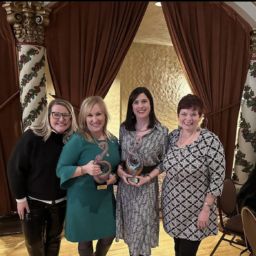
You probably learned the basics in school: what an adverb is, how to calculate the Pythagorean Theorem, and that George Washington was the first U.S. president. That foundational knowledge is certainly important, but how much does it actually prepare you for real life?
After all, knowing how to do geometry won’t help you cook a drool-worthy meal or invest in the stock market. We’re here to help: Here are six areas our amazing Indy Maven community think should be part of everyone’s education.
Mental Health Fitness
It’s likely that you might have taken a health or PE class while in school, but the U.S. education system largely pushes the importance of mental health to the wayside. According to the National Alliance on Mental Illness, one in every five U.S. adults experienced mental illness in 2019, meaning that the conversation surrounding mental health should be a whole lot bigger.
Sometimes, taking care of your mental health means asking for help when you need it. You don’t have to be alone during hard times, and having another person to give you advice and support can help ease the burden.
There are a variety of mental health resources right here in Indianapolis. Mental Health America of Indiana and Families First are organizations that offer programs focused on improving mental health, and both are recommended by the Indiana State Department of Health.
You can’t fill others’ cups when your own is empty, Mavens. Checking up on yourself and your mental health is just as important as keeping your physical health in shape. If you can, let yourself take a break when you’re feeling down or overwhelmed — you deserve it.
Financial Literacy
It’s official — we’ve graduated from piggy banks to the real deal. Still, though, the idea of investments, taxes, and overall money management remains incredibly daunting. Similar to mental health, there is an astounding lack of personal finance skills being taught in many schools.
So, how exactly does one become financially literate? For starters, there are some easy things you can start doing such as reading up on all things money matters, creating a simple budget, and most importantly, changing your fiscal mindset. To start understanding the topic, you have to be willing to take the time to learn on your own — after all, you’ll never learn anything if you keep telling yourself it’s too hard.
For starters, check out our past articles written by the financially savvy Samantha Kupiainen for practical money advice for every age or tips on how to pay off your student loans. Further, you can hone your money skills using resources such as Investopedia and The Financial Diet.
Entrepreneurship
Running a business is hard work, and it takes a wealth of knowledge to even begin one. It’s certainly more complex than your childhood lemonade stand or bake sale, but that doesn’t mean you can’t learn entrepreneurship skills now!
Let’s start with the basics: each entrepreneur needs to have basic financial skills (see above!), networking knowledge, excellent speaking skills, and a growth-oriented mindset.
If you’re interested in becoming an entrepreneur, check out Indeed’s seven-step how-to guide here! And definitely read up on our Mavens to Know—so many inspiring business minds have been featured over the past two years.
RELATED: PRACTICAL MONEY ADVICE FOR EVERY AGE
Racist History
Much of the information contained in American history textbooks has been whitewashed; they have been written in a way that omits incriminating details of white people’s actions to preserve their legacies.
Unlearning myths about colonial American innocence and reteaching ourselves the truth about systemic racism and injustice is a complicated process that can’t be taught overnight. Given that some states have recently banned critical race theory, this topic cannot be ignored any longer.
The Harvard Gazette’s article “How textbooks taught white supremacy” and Vox’s “How history textbooks reflect America’s refusal to reckon with slavery” are both excellent resources to begin understanding the truth about our nation’s past.
For even more information, try reading up on any of the Smithsonian Magazine’s 158 resources to understand racism in America.
It may be an uncomfortable truth, but it must be acknowledged.
Cooking Basics
Over the years, home economics has been largely abandoned within the American school system, leaving many with no idea how to even sew a button, let alone cook an entire meal. From grocery shopping to learning how to safely prepare meat, there are some kitchen basics that everyone (yes, EVERYONE) should learn.
Before you even begin cooking, you’ve got to make a grocery list. It’s vital to have a plan at the grocery store — otherwise, you’re liable to arrive home with bags full of miscellaneous goodies instead of ingredients for a meal.
Let’s not forget the importance of clean cooking, either! The kitchen can become a germy spot if you don’t keep it spic and span. Before cooking a meal, make sure you start with freshly washed hands and a germ-free countertop. The last thing you want is a food-borne illness, which is why you should also invest in a meat thermometer to minimize your risk of food poisoning.
When it comes to slicing and dicing up your food, a good set of knives will make the process much easier. Don’t know how to properly use sharp kitchen utensils? Check out this YouTube tutorial — your fingers will thank you.
For dining inspiration, try searching “easy meals” on Pinterest to find step-by-step instructions on how to make your own yummy recipes at home. There’s also an endless library of cooking tutorials on Youtube where you can learn from pros like Gordan Ramsey. Remember, practice makes perfect!
Cultivating Self-Love
The process of coming to love oneself takes time — it certainly can’t be learned overnight. It also takes personal dedication, as this skill must be self-taught. Feeling loved is vital, and you are your own singular reliable source of that.
There are many tactics you could incorporate into your everyday routine to show yourself a little extra love. Try saying positive affirmations to yourself each morning, allowing yourself forgiveness, and telling your inner critic to can it.
When you show yourself love, you’ll see positive changes in your relationships with others and in your everyday life. It can even result in better sleep and better health!
If you’re feeling stumped or in a rut, check out this Ted Talk on how to cultivate a sense of unconditional self-worth. Be kind to yourself, Mavens!
Katie Freeman is Indy Maven’s editorial intern.
All of our content—including this article—is completely free. However, we’d love if you would please consider supporting our journalism with an Indy Maven membership.









